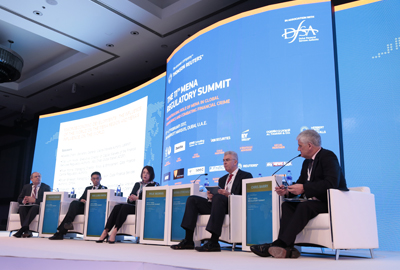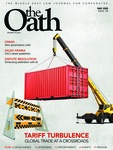Thomson Reuters & DFSA’s MENA Regulatory Summit

Thomson Reuters released the findings of the 3rd Financial Crime Report covering the Middle East and North Africa (MENA) region in collaboration with Deloitte.
The report was released at the inauguration of the Thomson Reuters MENA Regulatory Summit organised in association with the Dubai Financial Services Authority (DFSA) and under the patronage of H.E. Sultan bin Saeed Al Mansouri, the UAE Minister of Economy.
According to the report, a substantial number of respondents, 44 per cent, indicated a lack of confidence in their programs. Anti-Money laundering (AML) programs remain the priority for organizations, with 83 per cent of respondents choosing this program. Over a third of respondents indicated their lack of understanding of the regulatory environment was an issue, with 22 per cent pointing to the overwhelming pace and complexity of regulatory updates.
Financial crime programs are imposing on-going and ever increasing pressure on organizations to comply with both local and international regulation. Around 65 per cent of respondents indicated that their compliance investment had increased over the past two years, while 63 per cent indicated that they expected investment to continue to increase over next two years; a substantial jump from last year’s figures of 52 per cent.
In his opening remarks, Essa Kazim, Governor, Dubai International Financial Centre (DIFC) noted that the financial industry is influenced by new challenges presented by innovation as well as a fast developing regulatory environment.
The opening panel of the Summit addressed the influence of macroeconomic developments on the MENA region, and MENA’s influence on the rest of the world. The region is adopting a ‘wait and see’ approach to the implications of the Trump presidency on the regulatory environment, however Saade Chami, Secretary General, Capital Markets Authority, Lebanon, believes that if the US administration fulfils its promises to reduce taxes and increase infrastructure, the resultant increase of interest rates by the Federal Reserve will have a pull-down effect on growth in MENA.
The legitimacy of the current financial model is being questioned by large segments of the population, which poses a risk that governments could move to a more transactional model of regulation. There was widespread agreement that the importance of compliance will continue to increase in an increasingly turbulent world.
According to the Report, money laundering remains the most pressing financial crime issue. Reputation continues to be one of the biggest concerns for executives, which has led to a surge in the application of risk assessment processes to measure progress. Training is becoming more important as awareness grows for the need for a specific skillset that will be able to deploy changing technology, ever increasing in terms of sophistication, to its full potential. Organisations are tackling the compliance challenge with a combination of technology, training and the reorganisation of processes.
The report findings confirm that compliance professionals are increasingly cautious when choosing roles within organisations, and are seeking placements where there is active and visible support for the compliance function. In an era of increasing transparency and individual accountability, compliance personnel are choosing to work for a company where their input will be valued and they are not at risk of losing their positions because they are in constant conflict with senior management. The findings also confirm that compliance executives will have more access to technology that will be able to automate mundane compliance tasks and help reduce operational risks.

























































































































